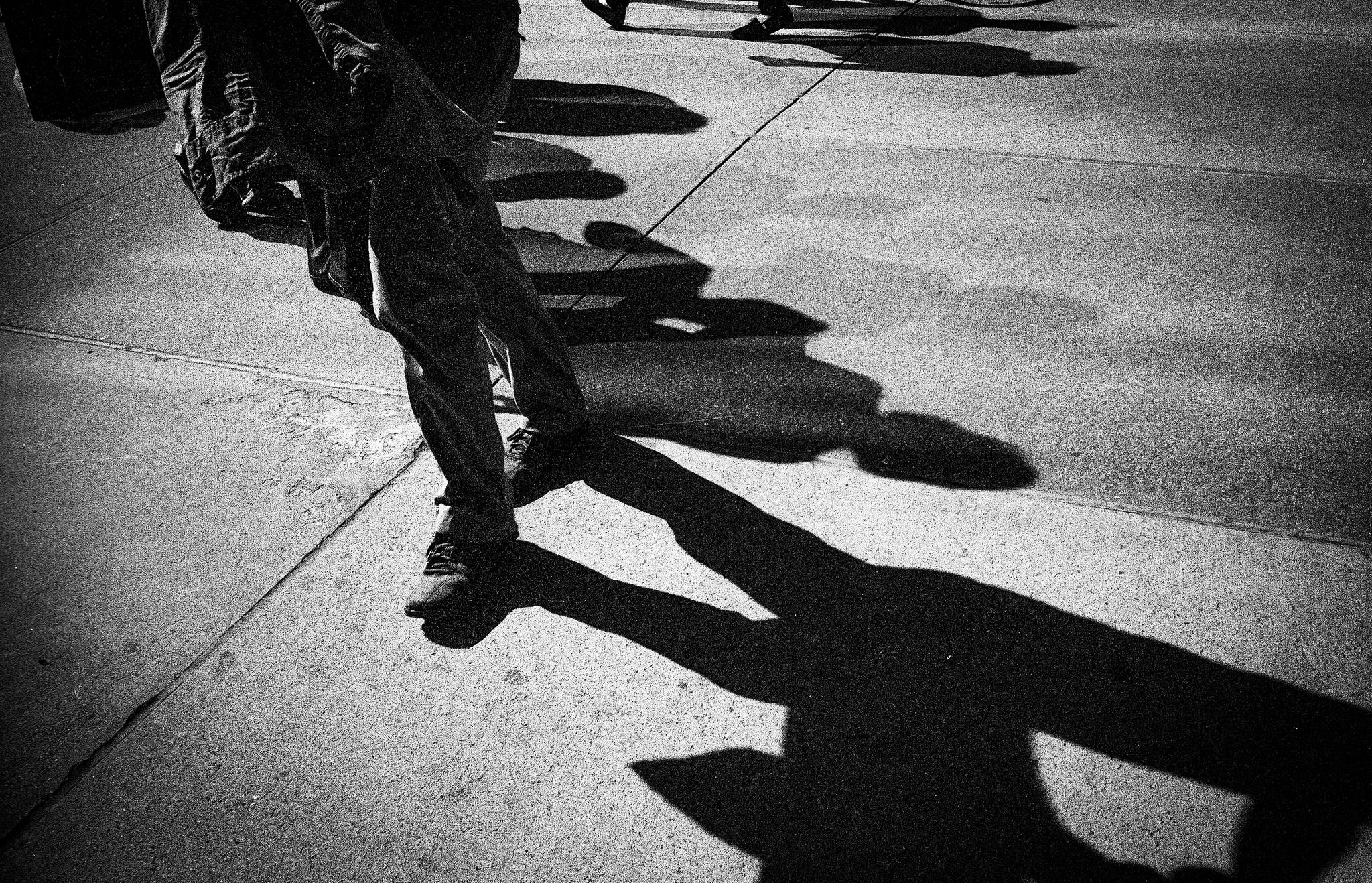
My friend was an art student at the Fine Art Academy in Kraków, and we were both participants in an exchange program, or perhaps more of a visiting program. A small group of students from Offenbach traveled to Poland. And I was with them, mainly as an interpreter.
We spent time in Zakopane, a beautiful place in the Tatra mountains, we drew, we fell in love, with the place, the people, the ideas. I behaved like a crazy person, singing about my upcoming departure to New York, drawing series of religious symbols, wearing insane flashy fashion and using incredible amounts of French cologne. I was a bit disgusting actually, but I still found friends who were able to see past my insanity and understood that I was excited and scared about the future at the same time.
Hunger and thirst (right up there with sleep deprivation) are actually among the oldest and most accessible mind-altering methods known to us humans. Many millions of people to this day follow traditions that challenge them to not eat for extended periods of time, or restrict their diet in some very specific way. Fasting may even alleviate some symptoms of depression, it can sharpen our senses and achieve a few other quite miraculous outcomes. There have been design studios named after the idea, and even the “most interesting man in the world” has often asked us to stay thirsty.
So, was my friend just being overly dramatic? Was he ignoring the creative power of deprivation? Probably not. The fasting and the thirst used to create new ideas is an intellectual choice and a bit of a luxury of the secure few. What my friend talked about was the stuff at the bottom of the Maslow’s Hierarchy of Needs. It was the uncertainty about the next meal, something that opens a very different view at creativity and creative progress. There are different kinds of creativity, actually. (More about that later.)
Maslow’s Pyramid or “Hierarchy of needs” first emerged in his 1943 paper “A Theory of Human Motivation”. It was created at a very critical time for humanity and it has been refined since. But the general premise remains the same: Our needs are very much interconnected and layered. A person without basic shelter and food will hardly try to spend time sharpening their psychological prestige and belonging. And someone who lacks those foundations will probably not assign time to indulge in philosophical discourse and self-actualization. Yes, taking long walks and eating less might be incredibly inspirational and healthy, but if both happen because one is homeless and struggles to find shelter, then no, not much about it is inspiring or magical or amazing.
And yes, people who are hungry and under major distress are able to be incredibly creative in ways of survival. (That’s the other kind of creativity.) But let’s not make that count here, because doing so would be a peak of cruelty.
That’s also why it is not fair to look at a beggar and decide that maybe he or she should not deserve any alms, because he or she was able to get themselves a pair of Jordans or a cane. If you get upset that the beggar on the subway is delivering a clearly made up story of cancer, a sick daughter and the expensive medication, while you are busy buying a $.99 token to finish your level difficult of “two dots”, please feel ashamed. The person asking for money might be inventing a story to get a few dollars out of a packed subway car, but they are likely in a much worse place than you and their experience was certainly not designed in California.
If you ever asked yourself if you should give to a beggar money, the answer is *yes*. (And please do not try to play God and give them a banana. You are not the guardian of the Garden of Eden, we are in a tough situation and a fellow human, not monkey, needs your help.)
Devices have tapped into the reward centers of our brains so skillfully that maybe a lot could be achieved if we designed cups for beggars to make the same fun sounds as candy crush or real casinos. We seem to be quite good in the exchange of funds for dopamine. We have been trained to be much more cautious when no “trusted” technology is involved.
We should actually probably all have a good look at Maslow’s Hierarchy of Needs. Right now might be a good moment in history for that. It might not be immediately apparent, but one of the most effective ways to control large groups of people is to push them down the Maslow’s pyramid and to forcefully make them busy with thoughts that become so all encompassing and so unavoidable that there is just no time left for creativity, ideas or resistance.
Imagine being part of a group of people who suddenly realize that their food might not be safe, or that their health might be under attack. What if you were one of those who are not certain if they will have anything to eat once they grow old? How about imagining that there are others who might potentially take away your security, your possessions, your clean water; the things you and your loved ones so urgently need to survive. Are you ready for all that? Have you prepared well enough? Are your walls and savings high enough?
It might not be very hard to imagine any of it, as those are precisely the pain-points that are being used by some few to push millions into a place of anxiety and fear and hard wired insecurity. Most of us might be better off than ever, but the idea of losing it all has the real potential of turning us into quite primal beings, mostly concerned with our very raw survival.
I am not revealing anything new here, of course. I have worked on quite a few marketing assignments that were designed to address the so called “reptilian brain” in our target group. Messaging can be tailored to address behavior that is driven out of a place in our brain that has been around since before we even knew we were human.
The farther up we go the Maslow’s pyramid the more unpredictable and creative humans can be. They can change anything, but their behavior is more difficult to measure, it has potential to seem like unpredictable magic. But the further down the pyramid users are pushed, and the closer to the base they can be kept, the more “digital” their minds become and quite a few decisions are not even rational but almost automated, predictable, transactional, subconscious. Those are easier to measure and monetize. What is the worth of a crazy idea compared to billions of clicks? What can be quickly extracted from one visionary, compared to millions and millions of consumers?
So, what are we to do? We are quite obviously at the edge of a time where we might be on the brink of some new war yet also finally able to create singing poo emojis. We find ourselves in a place where human monsters attack and abuse anyone they find weaker than themselves and yet it’s really fun to buy cryptocurrency that grows in value as it devours the resources of the planet.
It would be preposterous of me to unwrap any kind of solution or deep insight here. I am neither expert nor a prophet. But it feels, even at my simple level of understanding, that there are a few things we can do to claw our way back up the Maslow’s pyramid. Not just individually, but collectively, no matter what our belief system or affiliation.
I think we first need to understand that we are not the only ones feeling slightly lonely anxious and confused. Everyone is a bit scared, and if they are not, then they are either on some excellent medication, they are psychopaths or dogs. (And I am by no means saying that it is wrong to use medication in moderation, or be a canine companion on prozac.) It is incredibly important to understand that genuine human connections are possibly more valuable than algorithms and technology and big data. And yes, data might be the new oil, but creativity and empathy are still the kryptonite if forged the right way.
If you see a person in need, please don’t hesitate to help them. Do not judge them; they might be living a nightmare so scary it can’t be squeezed into a monologue short enough to be delivered between two commuter train stops. (Also consider that 100% of your donation and connection will actually benefit that person. No organization can claim to give it all directly to those in need, as far as I can tell?)
But you are the one even more endangered: Feed your mind with ideas that are challenging and maybe a little strange and unexpected. My grandfather used to say: If you listen to idiots, you will become an idiot. If you want things to be simple, you will become simple. This is really nothing new and I am a bit embarrassed for even writing it.
Give. Give as much as you can to as many as you can. Be giving. And I do not mean the sharing of stuff that increases measurable engagement on social media platforms. Don’t be a cog whose every turn can be sold, be an engine that can’t. Instead of trying to outdo and impress those around you, try as hard as you can to support them. Try to figure out who the “150” people are with whom you can actually have a meaningful relationship. (You can look up Dunbar’s Number to find out more about that group size.) Give. Give. Give.
Ideally, we would create a place where we can find ways to express our ideas and creativity and where no one is so desperate that they need to blow themselves up to be heard. We might be very limited and we might be under more pressure now than ever before, but it is not too late to give more of us the chance to be bored and ultimately have time to be creative.
Because a place where only a few are allowed to spend time with their free thoughts, while others are forced to focus on the next meal or their next anxiety, is not a happy place for anyone. (Not even those who could potentially do whatever they want with their time.)
“It’s very difficult to be creative when every third thought is hunger.” Yet it is creativity, not measurability that we need if we want to evolve as humanity. And evolve we must. (And I don’t mean removing headphone jacks or home buttons.)
There are too many of us on this planet to behave as if we were frightened little lizards.

Comments